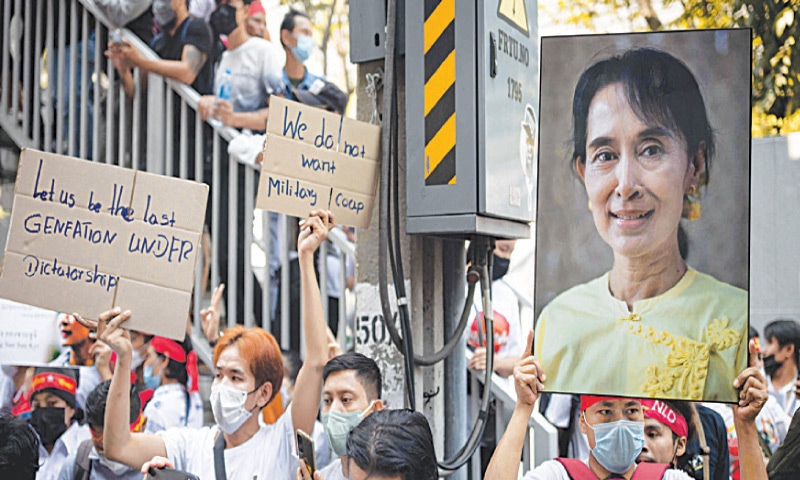The bad news from Myanmar is that its military junta has imposed martial law in areas where anti-military resistance is growing from strength to strength and extended the state of emergency for six months. It means the people there, accused of everything from treason to ‘spreading false news,’ will be tried by military tribunals. No one has a shadow of doubt that the charges will be trumped up. In the 37 townships affected by the new measures announced in the state-controlled media February 3, no appeals will be allowed for convictions handed down by military tribunals. Only cases where the death penalty is imposed will have to be approved by military chief Senior General Min Aung Hlaing.
One implication of the extension of martial law and the state of emergency is that the possibility of holding elections expected in August as announced before, whatever their worth, becomes uncertain. The new measures show the military junta has grown nervous even two years after it staged a coup and did not allow the installation of an elected government. This is because resistance against military dictatorship has spread throughout the country so much that the junta itself has admitted that its fiat does not run in one-third of the country. A measure of the determination of the people of Myanmar to stand up to the junta is the silent protest observed in the country to mark the second year of the military coup February 1. Streets in many cities fell quiet after protesters urged people to stay indoors and asked businesses to close. The main message of the silent strike is that the military “shall never rule the country’s people.”
In fact, the announcement appears to indicate that the military is looking for new ways to stamp out resistance in areas where people have taken up arms to fight against its seizure of power. The official explanation for the expansion of martial law is but an eyewash. Germany’s foreign ministry rightly described the new measures as “illegitimate steps” and rightly called for an end to the military’s violence and human rights abuses.
The military authorities stated the aim is “to exercise more effective undertakings for ensuring security, the rule of law and local peace and tranquility.” The 37 townships affected by the imposition of martial law are located across eight states and regions. Regular clashes between the military and the anti-coup People’s Defence Force, the armed wing of the opposition’s underground National Unity Government, have been continuing in the new areas to come under martial law.
Myanmar’s military has been struggling to contain a nationwide insurrection by opponents of military rule who took up arms after peaceful protests against the coup in February 2021 were suppressed with lethal force. According to an independent watchdog, at least 2,948 civilians have been killed since the military grabbed power and toppled elected leader Aung San Suu Kyi.
On the other hand, the country’s gross domestic product (GDP) shrunk by almost a fifth in 2021 before growing by just 3 per cent from a much smaller base the following year. The World Bank this week put Myanmar’s growth for the fiscal year ending in September at 3 per cent but warned that per capita GDP would remain about 13 per cent below its level before the COVID-19 pandemic. That means Myanmar’s 2023 GDP will still be smaller than the pre-coup economy.
Recovery from the shocks of COVID-19 and the coup “is expected to remain subdued in the near term, constrained by significant macroeconomic and regulatory uncertainty, persistent conflict, and ongoing electricity outages,” the World Bank said in its update.
The military regime has detained some of Myanmar’s tycoons and confiscated the passports of foreign corporate executives. Business groups and diplomats, including the friendly Chinese Ambassador, have openly expressed their dissatisfaction over the junta’s economic measures.
It means the international community, including the regime’s main supporter China, finds it difficult to invest in Myanmar plagued by a repressive regime, growing protests in large swathes of the land and a faltering economy. The junta appears to be fighting a losing battle. The best remedy for both the military and the people will be to begin dialogue and revive at least the hybrid democracy prevailing in the country before the military takeover. Tyranny and terror by the junta will plunge Myanmar into greater turmoil and chaos.
